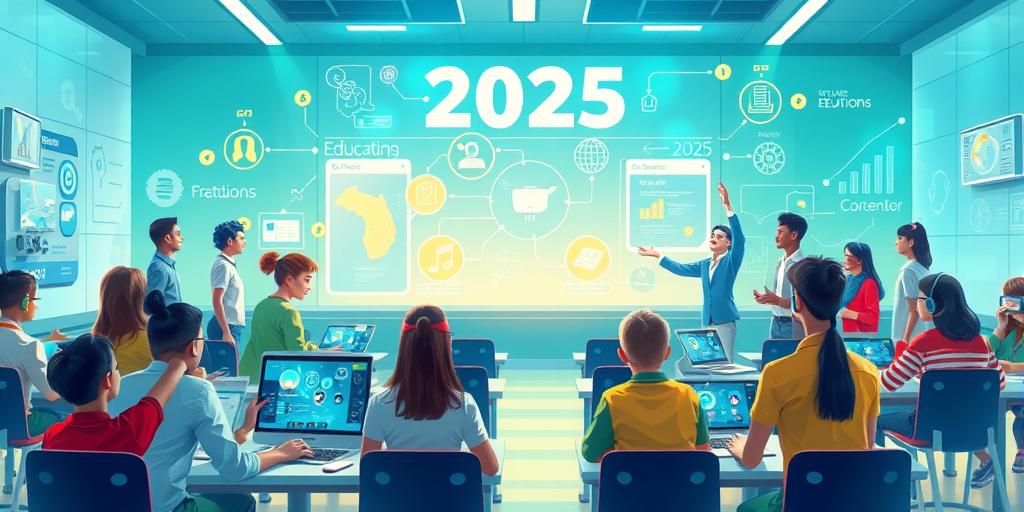Get ready to witness a revolution in learning! The year is 2025, and the future of education is nothing short of extraordinary. Forget stuffy classrooms and rigid schedules; we're diving headfirst into a personalized, tech-infused learning landscape that's as dynamic as it is effective. Prepare to be amazed as we explore the lifestyle and learning trends that are reshaping the educational world as we know it, transforming the way we learn, and making education more accessible than ever before.
Personalized Learning: The Rise of Adaptive Education
In 2025, education isn't one-size-fits-all. Personalized learning, powered by AI and big data, is taking center stage. Adaptive learning platforms analyze a student's strengths and weaknesses, tailoring the curriculum to their individual needs and pace. Imagine a learning experience that dynamically adjusts, offering challenges when you excel and extra support when you struggle. This isn't just about convenience; it's about maximizing individual potential and fostering a genuine love of learning. This personalized approach also extends to the methods of assessment, with continuous, subtle evaluation taking the place of high-stakes, high-pressure exams. This new paradigm will help students develop a growth mindset, allowing them to see learning as a journey, rather than a destination. This means no more rigid grading systems - instead, students will be assessed based on their individual progress and mastery of concepts.
AI-powered Tutors and Virtual Classrooms
Forget the traditional classroom. AI-powered tutors are available 24/7, providing personalized support and feedback. These digital mentors offer instant help, cater to individual learning styles, and adapt to a student’s progress in real-time. Virtual reality classrooms provide immersive and engaging learning environments, bringing history to life, exploring the human body, or even traveling to distant planets. The possibilities are endless. Moreover, these technological advancements are reducing the cost of education and making high-quality learning accessible to students from every background.
Experiential Learning: Beyond the Textbook
The future of education prioritizes hands-on, experiential learning. Gone are the days of passive learning; students actively participate in their learning journey, with a focus on practical skills, project-based learning, and real-world applications. Field trips aren't just school outings; they're integral parts of the curriculum. Students tackle real-world challenges, collaborating on projects with a focus on problem-solving, critical thinking, and creativity. In short, this approach makes learning an enjoyable and enriching experience. Through participation in internships and apprenticeships, students bridge the gap between education and employment, ensuring a smooth transition into the workplace.
Gamified Learning: Turning Education into a Game
Learning doesn't have to be a chore. Gamification integrates game mechanics into educational content, turning learning into an engaging and rewarding experience. Points, badges, leaderboards, and challenges motivate students and track their progress. It's a revolutionary approach that leverages the power of play to foster a love of learning and encourage perseverance. Students are motivated to learn because they want to advance in the game. This system creates a highly personalized and engaging learning experience.
Lifelong Learning: Embracing Continuous Education
Education in 2025 isn't a destination; it's a journey. Lifelong learning is the new norm. In a rapidly evolving world, continuous upskilling and reskilling are crucial. Flexible online courses, micro-credentials, and professional development opportunities are readily available, allowing individuals to adapt to changing job markets and pursue their passions throughout their lives. This continuous learning is crucial to success in a constantly changing world. Individuals will need to be adaptable and willing to acquire new skills throughout their careers. This concept is essential for keeping pace with technological advancements.
Micro-credentials and Skills-Based Learning
Forget traditional degrees – micro-credentials and skills-based learning are gaining ground. These focused certifications validate specific skills, making it easier to demonstrate expertise in a targeted area. This is particularly useful for those looking to quickly upskill or transition into a new career path. They offer a flexible, cost-effective way to acquire valuable skills and advance your career.
The Social Impact of the Future of Education
This transformation in the education system is not without significant implications for society. Accessibility and inclusivity will see major improvements, as technologies like AI-powered translation tools and personalized learning platforms help cater to diverse needs and abilities. The increasing demand for adaptable and flexible learning will create new opportunities for educators and other professionals, supporting further innovation in educational technologies. Moreover, it will help bridge the achievement gap, ensuring that students from all backgrounds have access to a high-quality education. By fostering creativity and problem-solving skills, future education will nurture the innovation required to overcome the challenges facing society.
Embrace the future of education! Get ready for a learning revolution that is personalized, accessible, engaging, and lifelong. This is the pathway to a brighter tomorrow, for you and for everyone.




